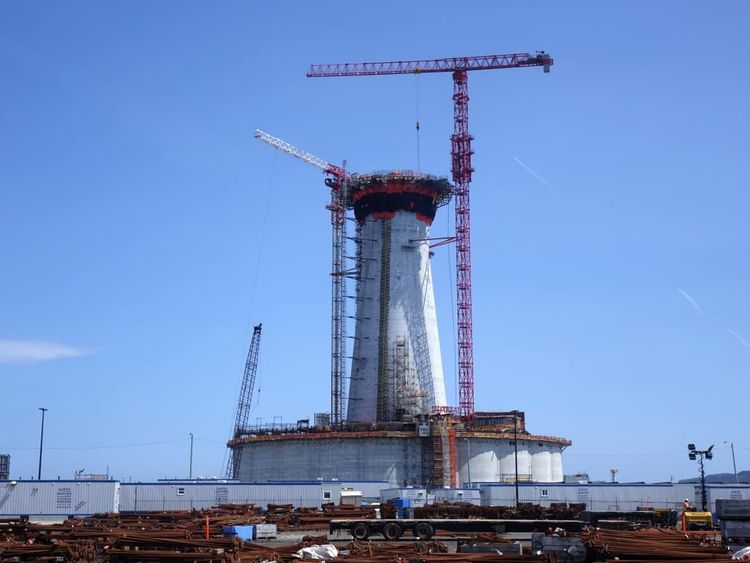NL Oil Sector Rebounds, But For How Long?

Work stopped on the West White Rose platform in Argentia, N.L. in 2020. However, there are now over 1,000 workers working day and night to construct the concrete gravity structure. The image credit goes to Patrick Butler at Radio-Canada.
The oil sector in Newfoundland and Labrador is getting better. The pandemic made some projects stop, but they are starting again. Work on building and exploring is going faster now. However, some people think that the need for oil will go down by 2030. So, how long will things be good for the oil sector?
Over 1,000 workers are working non-stop to pour concrete at the West White Rose site in Argentia. The base of the new offshore oil platform is already over 100 meters tall. Terra Nova, a floating production, storage, and offloading vessel, is getting fixed up in Bull Arm after a year of work in Spain. These projects almost didn't happen during the start of the pandemic when oil prices dropped.
Equinor gave out the first design contracts for the Bay du Nord project. This could be Newfoundland and Labrador's fifth offshore field. BP started drilling in the Orphan basin. ExxonMobil plans to drill in the Jeanne d'Arc basin this summer.
Last Friday, Paul Barnes, the regional director of the Canadian Association of Petroleum Producers, spoke about the upcoming Energy N.L. conference. He hopes the momentum will continue in the future. The conference lasts for three days, starting on Tuesday in St. John's. Barnes believes that the mood will be positive with oil execs and industry bigwigs present.
Angela Carter, an expert in global energy transition, thinks the increase in Newfoundland and Labrador's oil sector is a temporary boost. She also thinks it's like a final call for drinks at a bar. Barnes, on the other hand, is more positive.
People who study oil think that we've reached an agreement. They say that the world's need for oil is going to be at its highest in about 10 years, and then it will start to drop fast. This drop will be sudden and it won't go back up. This is what Carter, who works at the University of Waterloo, says.
The government believes that Newfoundland oil is important for the energy transition. They say it emits less carbon than other oils. Even if oil demand goes down, they think their oil will still be needed.
Carter thinks logic doesn't consider that most pollution comes from burning things. She also said drilling offshore costs more money. This could make Newfoundland a target for the energy transition. Companies might stop drilling there to save money.
Carter said that the industry is decreasing because of climate and energy transition.
Angela Carter wrote this blog section. Now, let's try to express it in simpler terms. Angela Carter is the author of this blog.
Tom Green thinks the Newfoundland and Labrador government is ignoring the problem. They're spending $13 million on seismic work to get oil companies to come to the area.
He said it makes no sense. We don't require fresh fields, wells or projects. International Energy Agency has been advising against starting new oil projects since 2021 for achieving climate goals.
Bay du Nord may be a pivotal moment. It's a significant discovery. The area could bring in huge profits. There may be more oil to find. It could transform the economy. We must consider the effects on the environment. This is a critical moment for Canada.
Barnes said that there has been an increase in construction in the local area because of West White Rose and Terra Nova. However, he stated that overall investment in the local offshore oil sector will not change much and will stay at around $1.5 billion in 2023. This is only if the Bay du Nord project doesn't happen.
Barnes says people in the oil industry are watching Equinor's decision. The decision is worth $16 billion. Barnes thinks this decision could change the sector.
In 2024, we will see the decision. It would be a long-lasting production. They would extract a billion barrels of oil.
Barnes thinks Equinor is important. They have exploration programs happening this summer. Barnes will watch the land sale by the Canada-Newfoundland and Labrador Offshore Petroleum Board too. This sale has land for future exploration. The sale will end in the fall.
This summer, two exploratory wells will be drilled. They may reveal billions of barrels of new recoverable oil. However, it would take many years of analysis and construction before production could begin.
You can find more articles on CBC Newfoundland and Labrador.













































































